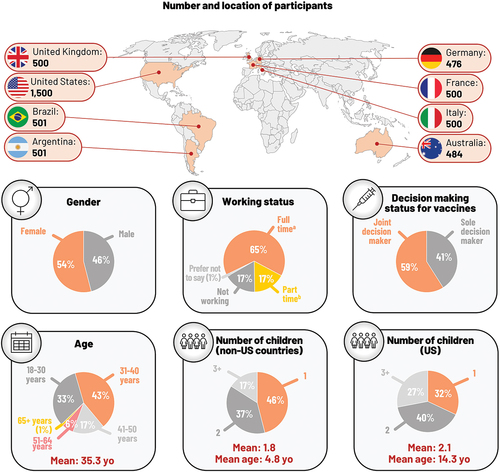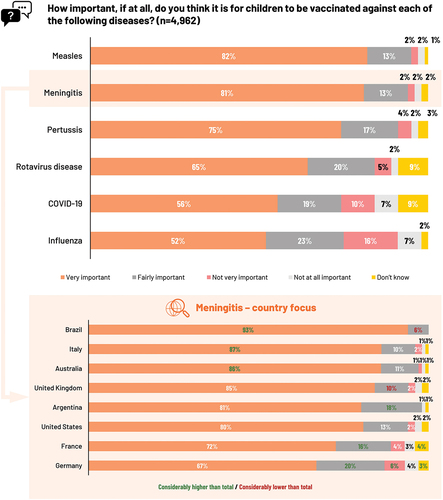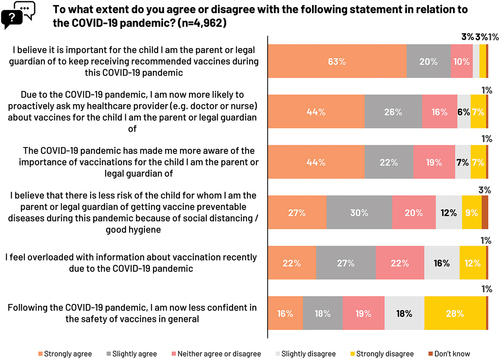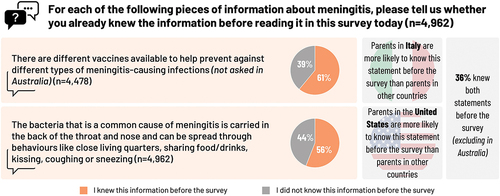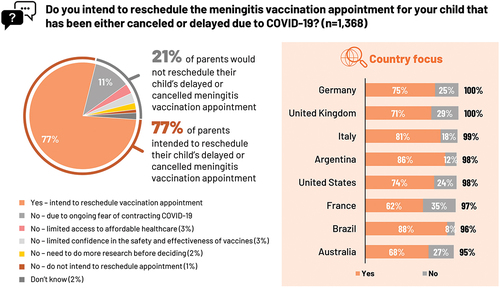ABSTRACT
Invasive meningococcal disease is a life-threatening infection preventable through vaccination. Pediatric vaccination rates have declined during the coronavirus disease 2019 (COVID-19) pandemic. This survey aimed to understand how parents’ attitudes and behaviors have changed during the pandemic with regard to immunization and, more specifically, meningococcal vaccination. An online survey was emailed to parents of eligible children 0–4 years, following the selection process from UK, France, Germany, Italy, Brazil, Argentina, and Australia; and of adolescents 11–18 years from US. Data collection took place 19 January–16 February 2021. Quotas were set to ensure a representative sample. Eleven questions relating to general perceptions around vaccination and attitudes and behaviors toward meningitis vaccination were displayed. On 4,962 parents (average 35 years) participating in the survey, most (83%) believed important for their child to continue receiving recommended vaccines during the COVID-19 pandemic. Nearly half of routine vaccine appointments were delayed or canceled due to the pandemic, and 61% of respondents were likely to have their children catch up once COVID-19 restrictions were lifted. 30% of meningitidis vaccination appointments were canceled or delayed during the pandemic, and 21% of parents did not intend to reschedule them because of lockdown/stay at home regulations, and fear of catching COVID-19 in public places. It is crucial to communicate clear instructions to health workers and the general population and to provide appropriate safety precautions in vaccination centers. This will help to maintain vaccination rates and limit infections to prevent future outbreaks.
Plain Language Summary
What is the context?
Invasive meningococcal disease (IMD) is an uncommon infection that can lead to permanent disabilities and even death.
Meningitis vaccination can prevent IMDs caused by Neisseria meningitidis.
Vaccination rates have declined during the coronavirus (COVID-19) pandemic.
What is new?
We collected opinion of parents from the UK, France, Germany, Italy, Brazil, Argentina, Australia, and the US, to understand their attitudes and behaviors toward meningitis vaccination during the COVID-19 pandemic.
Results were reviewed by health care professional experts as well as by patient authors (IMD survivors).
Most (83%) of the 4,962 parents believed that it is important for their child to continue receiving recommended vaccines during the COVID-19 pandemic.
Half of the scheduled appointments for meningitis vaccination were canceled or delayed during the COVID-19 pandemic, mainly due to lockdown regulations and fear of catching COVID-19.
Twenty-one percent of the parents who had their child’s meningitis vaccination appointment canceled, did not intend to reschedule it.
What is the impact?
It is crucial that clear information is communicated by health care authorities and practitioners about the availability of vaccination during pandemic and the safety precautions that are taken.
Collected opinions emphasize the importance of continuing vaccinations against infectious diseases during a pandemic.
Introduction
Invasive meningococcal disease (IMD) is an uncommon but serious infection caused by the bacteria Neisseria meningitidis.Citation1 IMD is a major public health concern and one of the leading causes of bacterial meningitis worldwide.Citation2,Citation3 In 2017, reported cases ranged from 0.1–2.4 per 100,000 population in the European Economic Area.Citation4 The incidence rate is highest in infants aged less than 1 year (0.93 per 100,000 population), followed by children (0.21), adolescents (0.21), and adults aged 65 years or older (0.13).Citation5 Despite its low incidence, this rapidly progressing and unpredictable disease can cause death in as little as 24–48 hours.Citation6 Overall, 10% of patients with IMD will die, even with appropriate treatment, and around 10–20% of those who survive may develop severe long-term sequelae (i.e., major physical and neurological disability).Citation2,Citation6,Citation7
Currently, the best way to prevent IMD is through vaccination. Meningococcal vaccines help protect individuals when they are properly vaccinated (i.e., fully vaccinated against the appropriate meningococcal serogroup).Citation8 The vaccination recommendations vary among countries. Most countries recommend meningitis vaccination for infants/toddlers and adolescents,Citation9–13 while in the United States (US), vaccination is routinely recommended only for adolescents of 11 to 18 years of age.Citation14
Vaccination uptake has inevitably been impacted during the coronavirus disease 2019 (COVID-19) pandemic, especially for those vaccines not fully included in national immunization programs, such as meningococcal vaccines. This happened, in part, because much healthcare provision has switched from face-to-face to online interactions, and many less urgent services have been cut back. Many people have been reluctant to attend in-person appointments, fearing increased exposure to the virus that causes COVID-19. Some parents assumed routine childhood immunization visits were not allowed during lockdowns that were enforced during the pandemic. The pandemic has also impacted attitudes toward health, and vaccinations specifically, and these shifts are likely to continue over the coming months.Citation15,Citation16 The current coverages rates for the vaccines that form part of the national immunization programs in several countries are substantially lower among children and adolescents, highlighting the importance of public health initiatives and educational interventions for healthcare providers and parents to increase routine childhood vaccination in these under-vaccinated pediatric age groups.Citation17,Citation18 The World Health Organization (WHO) recommends that all routine vaccinations should be administered as scheduled, even during the pandemic. There is currently no evidence that the COVID-19 pandemic poses any increased/specific risk linked to routine vaccination, and a potential contact with an individual with an infectious disease is not considered a contraindication for vaccination.Citation19
The objective of this study was to conduct a survey among parents from the United Kingdom (UK), France, Germany, Italy, Brazil, Argentina, Australia, and the US, to understand their attitudes and behaviors regarding the vaccination of their children against meningitis during the COVID-19 pandemic. The key results were discussed with external experts and, additionally, survivors of IMD shared their personal experiences of how the pandemic had affected them. Key results of this publication are also presented by some of the authors in a podcast (Additional file 1).
Materials and methods
Settings and participants
A multi-country, online survey was conducted by Ipsos Healthcare, on behalf of GSK, to understand the attitudes and behaviors of parents regarding the vaccination of their children against meningitis during the COVID-19 pandemic. Fieldwork and data collection were carried out between 19 January and 16 February 2021.
The survey included parents of children of 0 to 4 years of age from the UK, France, Germany, Italy, Brazil, Argentina, and Australia, and parents of adolescents of 11 to 18 years of age from the US. The different age range in the US was due to different vaccination schedules. All parents interviewed were at least 18 years old and either sole or joint decision-makers with regard to their children’s healthcare.
The sample size was 4,962 parents (distribution detailed in , Results section). Data were weighted to ensure the population was representative of each country and all markets had equal value at the reporting stage. To this end, the Random Iterative Method (RIM) weightings used, which allows different weights (e.g., gender, age, region, and work status) to be applied simultaneously. Further filter questions were asked to identify the sample for this survey (see Additional file 2, survey questions S1 to S8).
Survey development and administration
The survey was initially developed on a test server so that it could be tested prior to application in the field. The link went through several rounds of checks to ensure the study was functional at all levels. Then, using a soft launch, the survey was tested with a small sample (i.e., 10% of the total sample). At that point, data integrity was checked on two levels: the script, to make sure the logics were working correctly; and data quality. Once approved, the survey was launched to the total sample population.
The survey was not advertised; instead, the sample population was selected by the investigators and individuals were invited to participate via e-mail. Parents were selected from a large database of individuals aged 18 years or older who had signed up to complete voluntary surveys from a consumer network bringing together respondents across more than 130 countries (Cint). The national repertoires of the database had millions of engaged respondents in the selected countries; Argentina (n = 2.0 millions), Australia (n = 2.0 millions), Brazil (n = 14.9 millions), France (n = 5.3 millions), Germany (n = 4.0 millions), Italy (n = 3.1 millions), Spain (n = 2.7 millions), UK (n = 5.4 millions), and USA (n = 28.3 millions). A representative sample was identified by applying quotas by gender, age, geographic area of residence as well as work status. Further filter questions were used to identify the final data set.
Each screen/page of the e-mail survey contained one question, although some questions were in a grid format that required multiple entries. A total of 11 questions were displayed (excluding screening questions to ensure the respondent qualified for the survey). However, adaptative questioning was applied, and participants only answered those questions that were relevant according to their previous answers. Responses were automatically captured on a server while participants were completing the survey. The survey did not contain a review step, so respondents could not change or review their answers once submitted. To prevent bias, randomizations were made where applicable and relevant. Participation in the survey was voluntary, and respondents had the right to withdraw from the completing it at any moment. Only completed surveys were analyzed. Participants who completed the full survey were offered monetary incentives by the main panel supplier and also by any partner involved.
Response rates
The survey was “closed,” participants had to log in to the survey via a unique link and identification (ID) that was sent by e-mail. In case respondents did not complete the survey in one session, they were allowed to reenter the survey later using this link.
To prevent duplicate entries the following information was recorded: unique ID, encrypted internet protocol (IP) address, cookies placed before each question, and information about the respondent’s computer (i.e., browser, resolution, and operating system), which, when looked at in conjunction with the IP address, could be used to help identify duplicates.
Exclusion of low-quality answers was planned in the protocol. Investigators measured the time spent completing the questionnaire and excluded respondents who completed survey too quickly, who seemed to have not read the questions carefully or answered truthfully. The cutoff timeframe was determined by looking at the median length of time taken to complete the survey, based on all completed questionnaires and dividing each individual length of time by the median to compare their speed. This process was repeated for each country to account for language differences. A racer variable was also included to measure the average time spent per screen and flagged all respondents that spent less than eight seconds per screen. Another system checked whether a participant had entered the same response for all options in a grid.
Survey content
The e-mail survey included three rounds of questions. The first round (see Additional file 2, survey questions S1 to S8), also called the screener, aimed to filter/select the respondents' sample who qualified for the survey. It included questions regarding gender, age, country, region of residence, working status, whether the individual is a parent or legal guardian of any children, number of children, age of children, and decision-making status for vaccines. The second round (see Additional file 2, survey questions QA1 to QA4) included questions related to parents’ perceptions around vaccination. The third round (see Additional file 2, survey questions QB1 to QC3) contained questions related to attitudes and behaviors toward meningitis vaccination.
Ethical standards
All survey respondents were advised of its length, content, purpose, and where, how, and why the data are stored. No personal information was collected or stored. Respondents had the right to withdraw from completing the survey at any time.
As a member of the Market Research Society (MRS), Ipsos Healthcare is bound by the MRS Code of Conduct and all applicable laws protecting individuals’ personal data and responses.
Results
Survey respondents
After exclusion of 212 answers due to low quality data, a sample set of 4,962 parents was analyzed, 53.9% of whom identified as female. As shown in , the average age of all respondents was 35.3 years (standard deviation [SD]: 9.7 years). In the US, the average age of parents was 45.1 years (SD: 9.8 years), the average number of children by couple/adult was 2.1 (SD: 1.1), and their average age was 13.4 years (SD: 5.6 years). In the rest of the countries analyzed, the mean age of respondents was 33.9 years, the average number of children was 1.8, with an average age of 5.1 years. The majority of respondents were working full time, and almost 60% described their involvement in decisions concerning vaccination as a “joint decision-maker” (detailed in Table S1, see Additional file 3).
The survey took on average eight minutes to complete.
Perceptions around vaccination
Importance of vaccines
shows the percentage of parents who believed vaccination is important on a 1–4 scale (1: not at all important; 2: not very important; 3: fairly important; 4: very important) against the following diseases: measles (mean score: 3.8; SD: 0.6), meningitis (mean score: 3.8; SD: 0.6), pertussis (mean score: 3.7; SD: 0.6), rotavirus (mean score: 3.6; SD: 0.7), COVID-19 (mean score: 3.4; SD: 0.9), and influenza (mean score: 3.2; SD: 1.0). The majority of parents believed it is very important for children to be vaccinated against these diseases. Measles was considered the most important, followed by meningitis, pertussis, rotavirus, COVID-19, and influenza. The percentage of parents who believed that meningitis vaccination was important was considerably higher in Italy, Brazil, and Australia than in other countries, while the percentage was lower in France and Germany (detailed in Additional file 3, Table S2).
Awareness of childhood vaccination during the COVID-19 pandemic
shows that the majority of parents agreed (mean score: 4.4; SD: 1.0) it is important for the child they are the parent or legal guardian of to continue receiving recommended vaccinations during the COVID-19 pandemic on a 1–5 scale (1: strongly disagree; 2: slightly disagree; 3: neither agree or disagree; 4: slightly agree; 5: strongly agree). This percentage was notably higher in Brazil (mean score: 4.8; SD: 0.6) and Argentina (mean score: 4.6; SD: 0.8) compared with the percentages in other countries and considerably lower in France (mean score: 4.0; SD: 1.2) and Germany (mean score: 4.2; SD: 1.2) (detailed in Additional file 3, Table S3). A total of 34% of the parents agreed they felt less confident in the safety of vaccines in general following the COVID-19 pandemic (mean score: 2.7; SD: 1.4).
The impact of COVID-19 on childhood vaccination
Almost half of the parents stated that their child had a healthcare appointment delayed or canceled due to the COVID-19 pandemic. Cancelations were more likely in Argentina, while delays were more likely in Brazil and Argentina (shown in , detailed in Additional file 3, Table S4).
Figure 4. Healthcare visit/vaccine canceled or delayed during the COVID-19 pandemic.
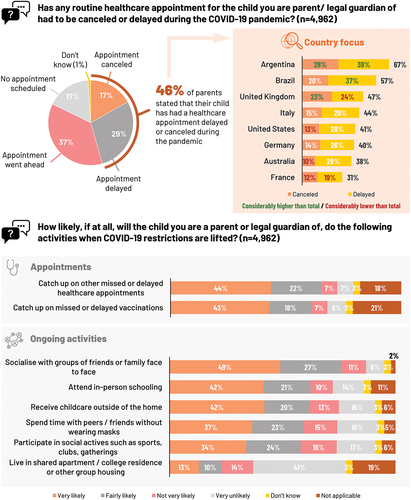
The survey showed that once COVID-19 restrictions are lifted, the majority of parents would be likely to have their children catch up on missed or delayed vaccinations (mean score: 3.3; SD: 1.0; 1: very unlikely; 2: not very likely; 3: fairly likely; 4: very likely) and healthcare appointments (mean score: 3.3; SD: 0.9). Parents in Italy (mean score: 3.5; SD: 0.8), Brazil (mean score: 3.4; SD: 1.0), and Argentina (mean score: 3.5; SD: 0.8) would be more likely to have their children catch up on missed or delayed vaccinations than parents in other countries, while parents in France (mean score: 2.6; SD: 1.1) and Germany (mean score: 3.2; SD: 1.0) were notably less likely to (detailed in Additional file 3, Table S5). Additionally, most parents stated their child would resume at least one of the listed “once this is over” activities involving close contact with others, with the two most likely activities being “socialize with groups of friends or family” (mean score: 3.2; SD: 1.0) and “attend in-person schooling” (mean score: 3.0; SD: 1.1).
Meningitis vaccination: attitudes and behaviors
Awareness of meningitis
The survey revealed that, overall, knowledge of meningitis among parents was good, although there is room for improvement (shown in and detailed in Additional file 3, Table S6).
Attitude toward meningitis vaccination during the COVID-19 pandemic
The majority of parents (mean score: 3.4; SD: 0.8; 1: definitely not; 2: probably not; 3: probably yes; 4: definitely yes) would still ensure their child attended an appointment for meningitis vaccination if it was scheduled during the pandemic, with French (mean score: 3.2; SD: 1.0) and German (mean score: 3.3; SD: 0.9) parents being less likely to have their children attend for meningitis vaccination ( and Additional file 3, Table S7).
Figure 6. Attitude toward meningitis vaccination during the COVID-19 pandemic.
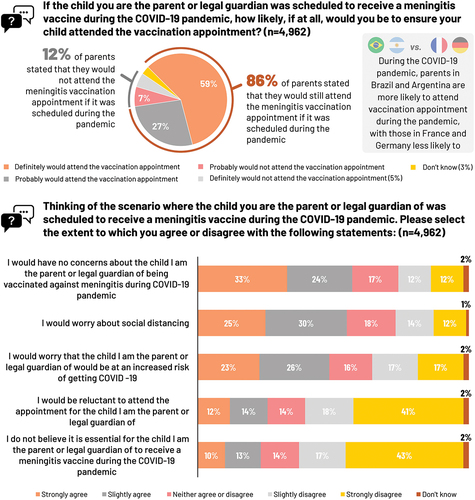
More than one in two parents (mean core: 3.5; SD: 1.4; 1: strongly disagree; 2: slightly disagree; 3: neither agree or disagree; 4: slightly agree; 5: strongly agree) had no concerns about their child being vaccinated against meningitis during the pandemic; however, half of the parents (mean score: 3.4; SD: 1.3) stated that they would worry about social distancing and their child being at increased risk of contracting COVID-19.
The impact of COVID-19 on meningitis vaccination
One in two parents whose child had an appointment for meningococcal vaccination during the COVID-19 pandemic stated that their appointment had been delayed or canceled. The percentage of delays/cancelations was higher in Brazil and Argentina than in the other countries surveyed (Additional file 3, Table S8). The primary reason was lockdown/stay at home regulations, followed by fear of catching COVID-19 in public places, and the need to take care of themselves or a family member who had COVID-19 infection ().
Figure 7. Meningitis vaccination appointments delayed or canceled during the COVID-19 pandemic.
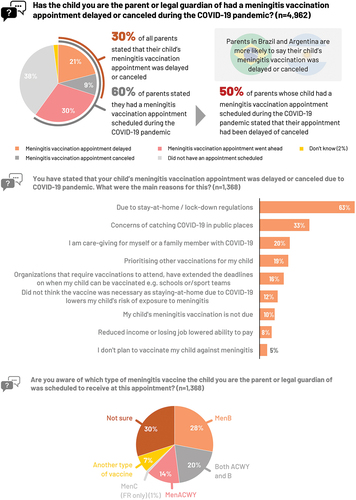
shows that although the majority of parents intended to reschedule delayed or canceled appointments for meningitis vaccination, 21% of them would not reschedule it; this percentage was notably higher in France and the UK than in other countries (detailed in Table S9, see Additional file 3).
Perception of external experts and patients
In the context of the COVID-19 pandemic, GSK organized a special event for World Meningitis Day, to increase the visibility of the impact of the pandemic on immunization rates for meningitis disease. During the event, three external experts shared their experience on the importance of continuing to vaccinate against meningitis during the COVID-19 pandemic and how they have ensured their clinics are safe places for patients to seek and receive vaccination. Dr. Michael Horn, a German pediatrician, declared:
I’m a pediatrician in my own pediatric office and I have to tell you that it is a major concern for me. After I discovered that in my pediatric office that the regular visits would go down, I have actively contacted my patients to get them into the office and tell them it’s safe to get vaccinated and it’s important.
During this session, Dr. Marco Safadi (Sao Paulo, Brazil) also shared his viewpoint:
I think the main message here is to be very clear: vaccination is an essential activity.
Survivors of IMD also shared their experiences with the disease, how it affected their lives, and how the COVID-19 pandemic had impacted them even more than before (isolation, cancellation of medical appointments, reduction of mobility for amputees, etc.). Survivor Jamie Schanbaum stated:
When it comes to me as a survivor of meningitis and how COVID-19 has affected or impacted, it definitely has impacted my life. When it comes to doctors’ appointments, I was really nervous about COVID-19, like everybody else. I know that COVID-19 is on the top of everybody’s mind, but I think it’s so important just to maintain what makes us stay healthy, by having access to those vaccines that are out there, so talk to your doctor.
Discussion
The COVID-19 pandemic has had a major impact on healthcare systems and immunization programs worldwide. Results from our online survey across eight countries showed that almost half of all vaccination or routine healthcare appointments scheduled during 2020 were delayed or canceled due to the pandemic. Once social distancing restrictions are lifted (still in place at the time of the survey), respondents anticipated that socializing and catching up on healthcare appointments would be their top priorities.
Several studies have reported on the impact of the COVID-19 pandemic on childhood vaccination, with an overall decrease in vaccination coverage worldwide.Citation15,Citation20–25 According to data published by WHO and the United Nations Children’s Fund (UNICEF), 23 million children missed their routine vaccinations in 2020.Citation26 Globally, the estimated number of children who missed their third dose of diphtheria – tetanus–pertussis vaccine was 30 million, representing a relative reduction of 7.7% compared with the expected number of doses that would have been administered in the absence of the pandemic. Additionally, coverage rates for the first dose of measles vaccine declined by 7.9%, with 27.2 million children missing their first dose in 2020.Citation27
Meningococcal vaccination rates have also declined during the pandemic, and achieving the rates seen during pre-COVID times might be challenging, especially in certain countries.Citation28 Our analysis showed that in the counties surveyed, 50% of appointments for meningitis vaccination were delayed or canceled during the pandemic, and 21% of these parents would not reschedule their child’s vaccination appointment. The major reason for not rescheduling was the fear of contracting COVID-19 in public places, followed by limited access to affordable healthcare, and limited confidence in the safety and effectiveness of vaccines. The uptake of meningococcal vaccines was already low in some regions before the pandemic. In previous studies conducted in the US, the most common reasons given for not vaccinating against IMD were concerns about side effects and uncertainty about the relationship between the two meningococcal vaccines, as well as providers not recommending vaccination and believing adolescents did not need the protection.Citation29,Citation30
Results from our survey shows the detrimental impact that COVID-19 pandemic had on meningococcal vaccination, especially in, UK, Germany and France where the coverage was already assessed as worrying.Citation31 As we have reported here, France and Germany had a considerably lower percentage of parents who considered meningitis vaccination important. They were also less likely to attend vaccination appointments during the pandemic. The percentage of parents who would not reschedule their child’s meningitis vaccination was higher in France, with 35% of the parents, and the UK, with 29% of the parents, saying that they would not reschedule their child’s meningitis vaccination. Meningitis vaccination has been compulsory in France since 1 January 2018, and the government also recommended compliance with the routine vaccination calendar during the pandemic.Citation32,Citation33 In the UK and Germany, meningitis vaccination is recommended but not mandated, although medical and ethical opinion on this matter is divided.Citation34,Citation35 While the COVID-19 pandemic is continuing, health authorities have recommended that all routine vaccinations continue to be administered as scheduled and have also designed catch-up strategies.Citation16 Vaccination overall should not be delayed; any disruption, even for short periods, would leave children at immediate risk of serious and, in some cases, life-threatening infectious diseases.Citation36
One of the most concerning results of our study was the percentage of parents who feel less confident with the safety of vaccines; 16% of parents strongly agreed and 18% of parents slightly agreed with the statement “following COVID-19 pandemic I am now less confident with the safety of vaccines in general.” This finding may reflect a potential increase in vaccine hesitancy following the pandemic, creating new challenges to recover vaccination coverage worldwide. A resurgence in vaccine-preventable infections that had been eliminated or controlled, such as measles, rubella, diphtheria, pertussis, and polio, and that result in significant morbidity and mortality in children, is a real danger.Citation37 For example, in February 2022, health authorities in Malawi declared an outbreak of wild poliovirus type 1 after a case was detected in a three-year-old, unvaccinated child in the capital Lilongwe.Citation38 This is the first case of wild poliovirus in Africa in more than five years, raising concerns that the virus could reemerge in the region.
This study had several limitations. First, as indicated in the Methods section, population selection was restricted to those who had signed up to a panel to complete this type of survey, had an internet connection, and were able to use it. These selection criteria might lead to possible selection bias. Second, there were several cross-country differences in parental demographics, such as the mean age (higher in the US with respect to the other countries) or working status, which may have influenced respondents’ answers. Third, all survey responses were based on self-reported questionnaires and were dependent on the respondents’ honesty and their understanding of the questions. Fourth, no statistical analysis was performed, thus comparisons among countries should be interpreted with caution. Finally, this study was performed in eight countries (i.e., the UK, France, Germany, Italy, Brazil, Argentina, Australia, and the US), and thus findings from this online survey may not be generalizable to other countries.
In conclusion, the COVID-19 pandemic has inevitably impacted routine childhood immunization; for instance, our survey results suggested half of all appointments for meningitis vaccination have been delayed during the pandemic. Vaccinations were not prohibited during quarantines or lockdowns, and appropriate safety precautions were taken at vaccination sites. However, urgent action is required to maintain vaccination rates and continue reducing the incidence of vaccine-preventable infections and diseases. It is critical that clear instructions are communicated by local authorities, health care practitioners, and patient advocates to avoid outbreaks of other vaccine-preventable diseases occurring at the same time as the pandemic.
Authors’ contributions
In the context of COVID-19 pandemic, GSK organized a special event for the World Meningitis Day to give visibility to the impact of the pandemic on immunization rates for meningococcal disease. The key results were presented and discussed by healthcare professionals. Survivors of invasive meningococcal disease shared their personal experience of how the pandemic has left survivors of IMD dealing with the consequences related to social distancing and mask mandates, in addition to less access to their ongoing care.
Litjen Tan, Marco Aurelio Palazzi Safadi and Michael Horn are healthcare professionals who interpreted and discussed the survey results. Cristina Regojo Balboa is a survivor of invasive meningococcal disease and president of an association against meningitis, and was involved in the interpretation and discussion of the survey results. Elena Moya is a survivor of invasive meningococcal disease and vice-president of an association against meningitis, and was involved in the interpretation and discussion of the survey results. Jamie Schanbaum and Pedro Pimenta are survivors of invasive meningococcal disease who interpreted and discussed the survey results. Emma Lambert participated in the design of the survey, analysis, and interpretation of the results. Lamine Soumahoro and Woo-Yun Sohn participated in interpretation of the survey results. Teresa Bruce led the GSK World Meningitis Day global media event and participated in the design of the survey, analysis, and interpretation of the survey results. Yara Ruiz García participated in interpretation of the survey results and had the idea of this manuscript and participated to the design and writing of this manuscript. All authors participated to the development of this manuscript. All authors had full access to the data and gave final approval before submission.
Ethics approval
Being a survey, no ethics approval was sought. This survey was conducted by Ipsos Healthcare, on behalf of GSK. Ipsos Healthcare is bound by the MRS Code of Conduct and all applicable laws protecting personal data and responses. The study was conducted in compliance with MRS, ESOMAR, EphMRA, and British Healthcare Business Intelligence Association (only for UK) guidelines. The online survey questionnaire was done on parents to understand the attitudes and behaviors toward vaccination. Consents to participate and disclosure were collected as part of the survey questionnaire.
Supplemental Material
Download MP4 Video (39.2 MB)Supplemental Material
Download PDF (265.2 KB)Supplemental Material
Download PDF (460 KB)Acknowledgments
The authors thank all participants who were involved in the survey. The authors thank Marta Palla for her review of this manuscript. The authors also thank Business & Decision Life Sciences platform for editorial assistance, manuscript coordination, and writing support, on behalf of GSK. Leire Iralde Lorente (Business & Decision Life Sciences) provided medical writing support.
Disclosure statement
Yara Ruiz García, Lamine Soumahoro, Woo-Yun Sohn and Teresa Bruce are employed by GSK and hold shares in GSK. Marco Aurelio P. Safadi reports his institution received research grants from Pfizer and Janssen for activities outside the presented work. He also reports having received fees for advisory board consultation and lectures from GSK, Abbott, Sanofi-Pasteur, Seqirus, AstraZeneca, MSD, Janssen and Pfizer; for activities outside the presented work. Michael Horn reports honoraria from GSK, Sanofi, MSD, Pfizer and Novartis Vaccines as an investigator in vaccine clinical trials, as a consultant and member of advisory boards, and has appeared on speaker forums for these companies. Litjen (L.J) Tan has nothing to disclose. Jamie Schanbaum, Cristina Regojo Balboa and Elena Moya have nothing to disclose. Pedro Pimenta reports payments from GSK outside the presented work. Emma Lambert reports her institution received payments from GSK for the conduct of the survey. The authors declare no other financial and non-financial relationships and activities.
Supplementary material
Supplemental data for this article can be accessed on the publisher’s website at https://doi.org/10.1080/21645515.2023.2179840
Additional information
Funding
References
- Pizza M, Bekkat-Berkani R, Rappuoli R. Vaccines against meningococcal diseases. Microorganisms. 2020;8(10):1521. doi:10.3390/microorganisms8101521.
- Chang Q, Tzeng YL, Stephens DS. 2012. Meningococcal disease: changes in epidemiology and prevention. Clin Epidemiol. 4:237–12. doi:10.2147/CLEP.S28410.
- Rappuoli R, Pizza M, Masignani V, Vadivelu K. Meningococcal B vaccine (4CMenB): the journey from research to real world experience. Expert Rev Vaccines. 2018;17(12):1111–21. doi:10.1080/14760584.2018.1547637.
- European Centre for Disease prevention and Control (ECDC). Surveillance report: invasive meningococcal disease – annual Epidemiological Report for 2017 [accessed 2022 Dec 8]. https://www.ecdc.europa.eu/sites/default/files/documents/AER_for_2017-invasive-meningococcal-disease.pdf.
- Centers for Disease Control and Prevention. Enhanced Meningococcal Disease Surveillance Report; 2016 [accessed 2022 Dec 8]. https://www.cdc.gov/meningococcal/downloads/NCIRD-EMS-Report.pdf.
- Olbrich KJ, Müller D, Schumacher S, Beck E, Meszaros K, Koerber F. Systematic review of invasive meningococcal disease: sequelae and quality of life impact on patients and their caregivers. Infect Dis Ther. 2018;7(4):421–38. doi:10.1007/s40121-018-0213-2.
- Centers for Disease Control and Prevention (CDC). Meningococcal disease [accessed 2022 Dec 8]. https://www.cdc.gov/meningococcal/index.html.
- Trotter CL, Maiden MC. Meningococcal vaccines and herd immunity: lessons learned from serogroup C conjugate vaccination programs. Expert Rev Vaccines. 2009;8(7):851–61. doi:10.1586/erv.09.48.
- Queensland Government. Immunisation schedule Queensland. Children [accessed 2022 Dec 8]. https://www.health.qld.gov.au/__data/assets/pdf_file/0032/989114/qld-immunisation-schedule-children.pdf.
- European Centre for Disease prevention and Control (ECDC). Meningococcal disease: recommended vaccinations [accessed 2022 Dec 8]. https://vaccine-schedule.ecdc.europa.eu/Scheduler/ByDisease?SelectedDiseaseId=48&SelectedCountryIdByDisease=-1.
- Organización Panamericana de la Salud (PAHO). Meningococo [accessed 2022 Dec 8]. https://www.paho.org/es/temas/meningococo.
- Booy R, Gentile A, Nissen M, Whelan J, Abitbol V. Recent changes in the epidemiology of Neisseria meningitidis serogroup W across the world, current vaccination policy choices and possible future strategies. Hum Vaccin Immunother. 2019;15(2):470–80. doi:10.1080/21645515.2018.1532248.
- National Heath System (NHS) UK. Vaccination - Meningitis [accessed 2022 Dec 8]. https://www.nhs.uk/conditions/meningitis/vaccination/.
- U.S. Department of Heath and Human Services - Centers for Disease Control and Prevention. Recommended Child and Adolescent Immunization Schedule for ages 18 years or younger [accessed 8 Dec 2022]. https://www.cdc.gov/vaccines/schedules/downloads/child/0-18yrs-child-combined-schedule.pdf.
- Chiappini E, Parigi S, Galli L, Licari A, Brambilla I, Angela Tosca M, Ciprandi G, Marseglia G. Impact that the COVID-19 pandemic on routine childhood vaccinations and challenges ahead: a narrative review. Acta Paediatr. 2021;110(9):2529–35. doi:10.1111/apa.15949.
- WHO Regional Office for Europe. Mitigating the impact of COVID-19 on control of vaccine-preventable diseases: a health risk management approach focused on catch-up vaccination [accessed 2022 Dec 8]. https://apps.who.int/iris/bitstream/handle/10665/334248/WHO-EURO-2020-1086-40832-55187-eng.pdf?sequence=1&isAllowed=y.
- DeSilva MB, Haapala J, Vazquez-Benitez G, Daley MF, Nordin JD, Klein NP, Henninger ML, Williams JTB, Hambidge SJ, Jackson ML, et al. Association of the COVID-19 pandemic with routine childhood vaccination rates and proportion up to date with vaccinations across 8 US health systems in the vaccine safety datalink. JAMA Pediatr. 2022;176(1):68–77. doi:10.1001/jamapediatrics.2021.4251.
- Shet A, Carr K, Danovaro-Holliday MC, Sodha SV, Prosperi C, Wunderlich J, Wonodi C, Reynolds HW, Mirza I, Gacic-Dobo M, et al. Impact of the SARS-CoV-2 pandemic on routine immunisation services: evidence of disruption and recovery from 170 countries and territories. Lancet Glob Health. 2022;10(2):e186–94. doi:10.1016/S2214-109X(21)00512-X.
- WHO Regional Office for Europe. Q&A on vaccination during the COVID-19 pandemic [accessed 2022 Dec 8] https://www.euro.who.int/en/health-topics/disease-prevention/vaccines-and-immunization/q-and-a-on-vaccination-during-the-covid-19-pandemic.
- McDonald HI, Tessier E, White JM, Woodruff M, Knowles C, Bates C, Parry J, Walker JL, Scott JA, Smeeth L, et al. Early impact of the coronavirus disease (COVID-19) pandemic and physical distancing measures on routine childhood vaccinations in England, January to April 2020. Euro Surveill. 2020;25(19): Pii-2000848. doi:10.2807/1560-7917.ES.2020.25.19.2000848.
- Moraga-Llop FA, Fernández-Prada M, Grande-Tejada AM, Martínez-Alcorta LI, Moreno-Pérez D, Pérez-Martín JJ. Recuperando las coberturas vacunales perdidas en la pandemia de COVID-19. Vacunas. 2020;21(2):129–35. doi:10.1016/j.vacun.2020.07.001.
- Moreno-Montoya J, Ballesteros SM, Rojas Sotelo JC, Bocanegra Cervera CL, Barrera-López P, De la Hoz-Valle JA. Impact of the COVID-19 pandemic on routine childhood immunisation in Colombia. Arch Dis Child. 2021;107(3):1–6. doi:10.1136/archdischild-2021-321792.
- Nuzhath T, Ajayi KV, Fan Q, Hotez P, Colwell B, Callaghan T, Regan AK. Childhood immunization during the COVID-19 pandemic in Texas. Vaccine. 2021;39(25):3333–37. doi:10.1016/j.vaccine.2021.04.050.
- Rana MS, Ikram A, Salman M, Usman M, Umair M. Negative impact of the COVID-19 pandemic on routine childhood immunization: experience from Pakistan. Nat Rev Immunol. 2021;21(11):1–2. doi:10.1038/s41577-021-00627-7.
- Società Italiana di Pediatria. Un genitore su tre ha rinviato le vaccinazioni dei propri figli a causa del Covid-19 [accessed 2022 Dec 8]. https://sip.it/2020/07/01/un-genitore-su-tre-ha-rinviato-le-vaccinazioni-dei-propri-figli-a-causa-del-covid-19/.
- World Health Organization (WHO). COVID-19 pandemic leads to major backsliding on childhood vaccinations, new WHO, UNICEF data shows. https://www.who.int/news/item/15-07-2021-covid-19-pandemic-leads-to-major-backsliding-on-childhood-vaccinations-new-who-unicef-data-shows.
- Causey K, Fullman N, Sorensen RJD, Galles NC, Zheng P, Aravkin A, Danovaro-Holliday MC, Martinez-Piedra R, Sodha SV, Velandia-González MP, et al. Estimating global and regional disruptions to routine childhood vaccine coverage during the COVID-19 pandemic in 2020: a modelling study. Lancet. 2021;398(10299):522–34. doi:10.1016/S0140-6736(21)01337-4.
- Saxena K, Marden J, Carias C, Bhatti A, Patterson-Lomba O, Gomez-Lievano A, Yao L, Chen YT. Impact of the COVID-19 pandemic on adolescent vaccinations: projected time to reverse deficits in routine adolescent vaccination in the United States. Curr Med Res Opin. 2021;37(12):1. doi:10.1080/03007995.2021.1981842.
- Coyne-Beasley T, Reiter PL, Liberty AC, Ford CA, Miles DR, Brewer NT. Awareness is not enough: the need to increase meningococcal vaccine uptake. Clin Pediatr (Phila). 2013;52(5):441–50. doi:10.1177/0009922813481847.
- Richardson E, Ryan KA, Lawrence RM, Harle CA, Young A, Livingston MD, Rawal A, Staras SAS. Perceptions and knowledge about the MenB vaccine among parents of high school students. J Community Health. 2021;46(4):808–16. doi:10.1007/s10900-020-00954-1.
- Gaudelus J, Cohen R, Leboucher B, Stahl JP, Denis F, Pujol P, Longfier L, Martinot A. Meningococcal C vaccine coverage in France in infants, children, and adolescents. Médecine et Maladies Infectieuses. 2019;49(3):180–86. doi:10.1016/j.medmal.2019.01.014.
- Ministère des solidarités et de la santé. Calendrier des vaccinations et recommandations vaccinales 2022 [accessed 2022 Dec 8]. https://solidarites-sante.gouv.fr/IMG/pdf/calendrier_vaccinal_2022_mis_a_jour_juin_2022_v2.pdf.
- Vaccination infoservice.fr. Nourrissons et enfants (de la naissance à 13 ans) [accessed 2022 Dec 8]. https://vaccination-info-service.fr/La-vaccination-au-cours-de-la-vie/Nourrissons-et-enfants-de-la-naissance-a-13-ans.
- UK Parliament. House of commons library. UK vaccination policy [accessed 2022 Dec 8]. https://commonslibrary.parliament.uk/research-briefings/cbp-9076/.
- Federal Ministry of Health. Vaccinations [accessed 2022 Dec 8]. https://www.bundesgesundheitsministerium.de/english-version/topics/vaccinations.html.
- Centers for Disease Control and Prevention (CDC). Risks of delaying or skipping vaccines [accessed 2022 Dec 8]. https://www.cdc.gov/vaccines/parents/schedules/risks-delaying-vaccines.html.
- World Health Organization (WHO). At least 80 million children under one at risk of diseases such as diphtheria, measles and polio as COVID-19 disrupts routine vaccination efforts, warn Gavi, WHO and UNICEF [accessed 2022 Dec 8]. https://www.who.int/news/item/22-05-2020-at-least-80-million-children-under-one-at-risk-of-diseases-such-as-diphtheria-measles-and-polio-as-covid-19-disrupts-routine-vaccination-efforts-warn-gavi-who-and-unicef.
- World Health Organization (WHO). Malawi declares polio outbreak [accessed 8 December 2022]. https://www.afro.who.int/news/Malawi-declares-polio-outbreak.

